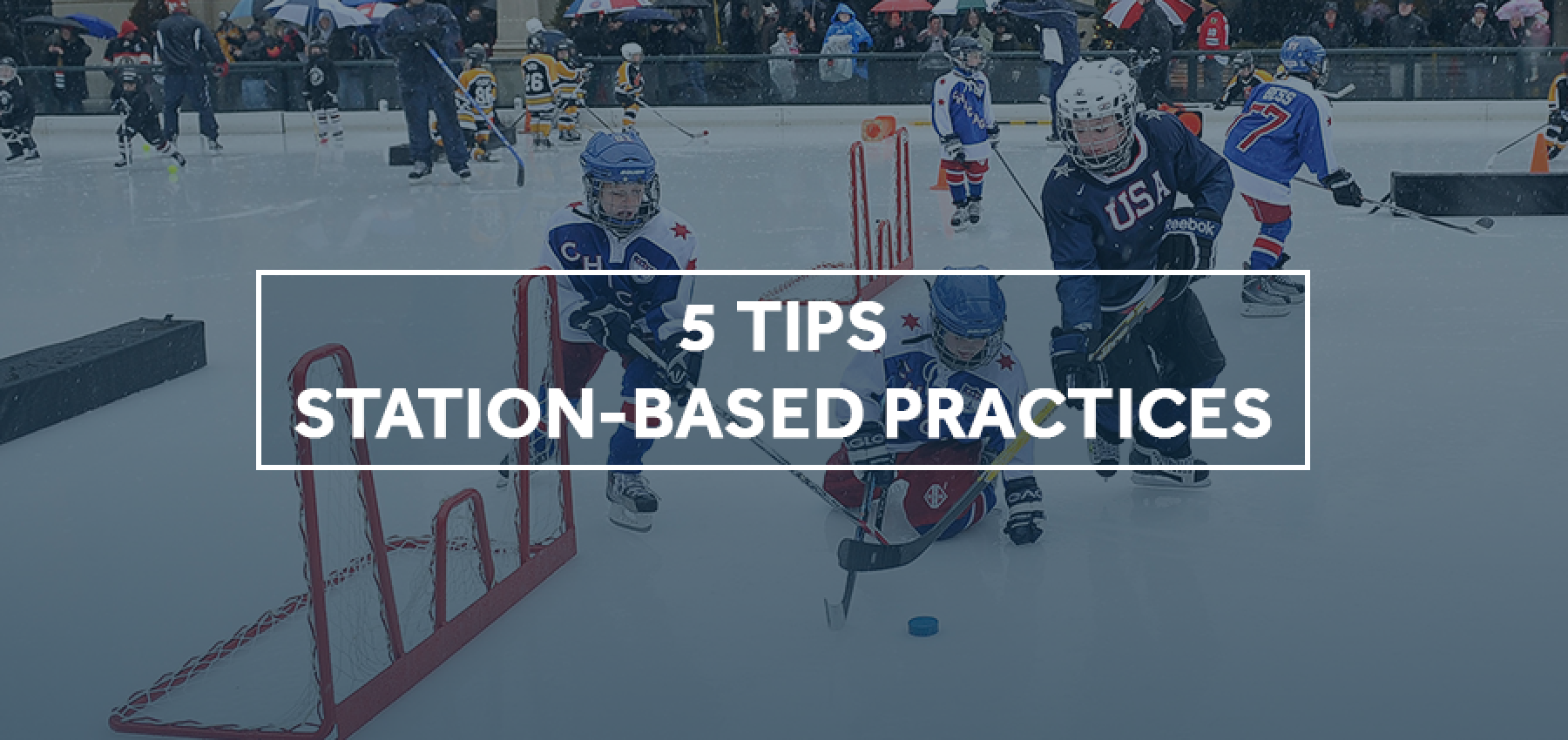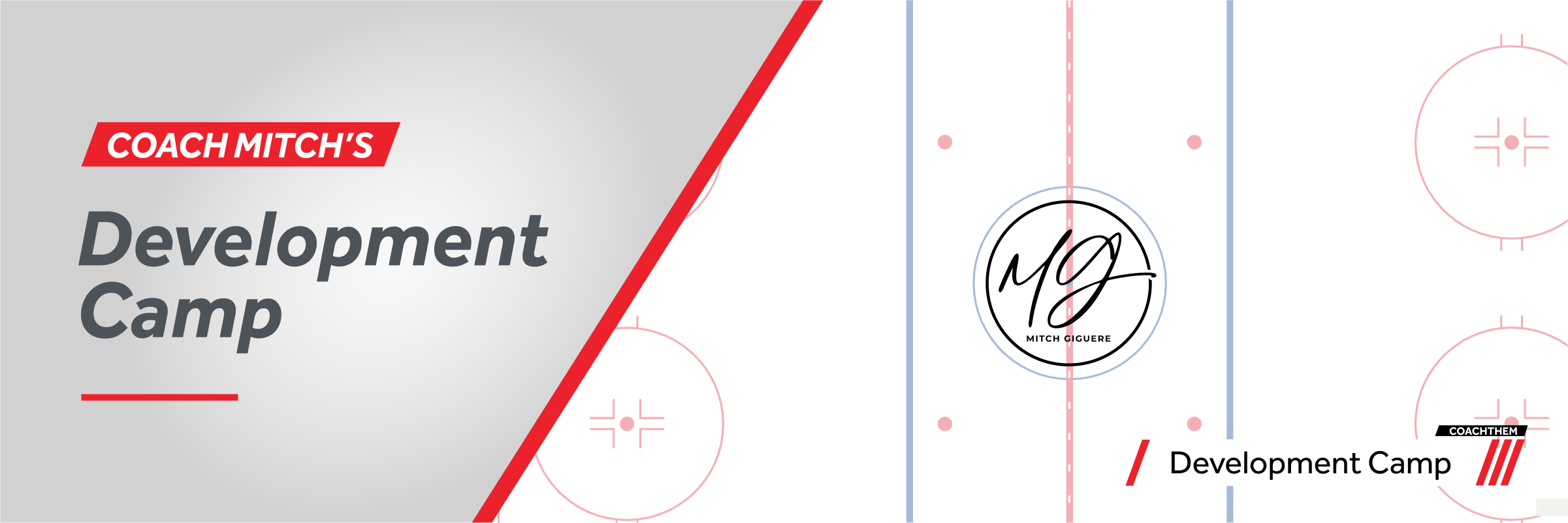Select your default language

Top 5 Station-Based Practice Tips, Mike Bonelli
Ice time is extra precious these days, so it’s vital for coaches to capitalize on every available minute of practice they have with their players.
One of the best ways to accomplish that objective is by planning high-quality, station-based practices that give your athletes a chance to hone their skills one step at a time and steadily progress as they move from station to station.
Putting a proper station-based practice together takes commitment and vision, so we asked veteran Connecticut Junior Rangers coach Mike Bonelli to share some of the top tips in his arsenal, including the concept behind one of his most creative and fun practices yet - the "St. Louis Night of Skills Practice" - which is now available in the CoachThem Marketplace!
1. Winging it won’t work
If you don’t do your homework before heading to the rink, you’re doing your players a real disservice. There are a lot of things to consider when you’re planning a practice and a station-based session takes even more consideration. It's important to have every element mapped out ahead of time. Once you know how much ice and time you’re working with, along with your equipment and staffing needs, you can start diagramming the age and skill-appropriate drills you’re going to run. You’ll want to build in progressions from station to station as well, so give yourself time to think each drill through and reflect on the purpose behind incorporating it into your plan. I share my practices with my assistant coaches and players a day or two ahead of time so everyone’s in the loop. We owe it to them to come prepared, especially with access to great tools like CoachThem. You don’t want to be that coach from yesteryear that resorts to putting kids in the corner of the rink, doing a couple of circle drills, and ending practice with a 3-on-3 cross-ice scrimmage.
2. Head on a swivel
I don’t create my station-based practices out of thin air. I pay extra close attention to the little details in our games and build my stations based on the areas where we might’ve struggled collectively. If we’re having trouble with breakouts, for example, I’ll break the stations down into small pieces of the puzzle and we’ll cover every component – angling, passing, gapping, finding ice, posting up. That’s how you bring it all together. I can’t stress the importance of critical observation enough when you’re behind the bench so you can identify your squad’s weaknesses. Station-based practices provide the ideal setting to break everything down and make changes.
Lots of stealing drills and ideas from @TheCoachesSite @DStarmanHockey presentations & @mikeweaver_43 @coachthem site to help change up the action and continue to add practice plans to help our great @colonialshockey support coaches accomplish our goals #haveaplan pic.twitter.com/d34gwMtpw6
— Michael Bonelli (@mikebonelli) October 30, 2019
3. Quality reps and quality rest
Consider the work-to-rest ratio in your players when designing your station-based practice because you’ll have to find an appropriate balance. As much as you want to get their heart rate going and their mind thinking quicker, they’ll also need a little downtime to re-energize in between reps and stations. Remember that pods allow players to replicate what you want in practice many, many more times than in a traditional flow drill, so be conscious of their rest needs. You can also regulate the intensity and rest needs associated with a station-based practice in a much easier way than in a full-ice environment. Plan appropriately and use that to your advantage.
4. Fun matters
Station-based practices shouldn’t just look and feel like a real game, they should be enjoyable and create competition as well. That was my motivation behind creating the “St. Louis Night of Skills” which featured six different stations with drills mimicking classic goals scored by Hall of Famer, Martin St. Louis, who also coaches with the Connecticut Junior Rangers. It was the perfect way to blend teaching and fun together – and replicating Martin’s plays and breaking down the small things he did to create space, lanes and change angles is a great example for players of all ages to follow. I embedded the videos into the CoachThem drills, so everyone knew exactly what we were trying to recreate. That’s the kind of genuine enjoyment station-based practices can foster when you get creative!

St. Louis Night of Skills Practice (Click rink to play video)
5. Develop a collaborative environment
I tend to design practices so that coaches that assist me can run the stations. That allows me to spend more time focusing on individual players who might need some extra help. I can go from station to station, pull a kid out from time to time for a quick chat and some pointers, and I’m not interrupting the flow of practice. It’s a great setting for that one-on-one approach. I love it because I really get to teach and influence kids as they get more and more reps and touches. When I’m talking to one of my players, we can have a private conversation to try and fix something, and then they head right back to the drill, skill or game and adjust in real time without affecting the rest of the group.
The tighter the competition the more you need to learn to get an edge ... great seeing how @CJRHockey incorporate high performance skill development into their daily plans with weekly @usahockey inspired SAGs, transition activities & activation drills shared through @coachthem https://t.co/zbrZSx4DUr
— Michael Bonelli (@mikebonelli) September 16, 2020
Mike Bonelli boasts over three decades of experience as a coach, hockey director, program director, rink builder, and development director, so he knows a good hockey product when he comes across one. A fervent supporter of the CoachThem platform, Bonelli is the owner and operator of Mike Bonelli Hockey Solutions where he focuses his efforts on helping to build youth hockey programs and advising them on using a variety of different tools within the hockey community to maintain and grow their membership base. In addition to previous coaching stints in the high school, prep school and collegiate ranks, Bonelli currently coaches in the Connecticut Junior Rangers program and also serves as a member of the USA Hockey Coaching Education Team for New York State. He also served as an assistant coach with the NWHL’s Connecticut Whale during the 2019-20 campaign. Visit his Twitter and Instagram pages to learn more about his work.
Recommended Posts

On the Ice: A Recap of Mitch Giguere’s NHL Development Camp Experience
At CoachThem, we are always excited to share firsthand experiences and insights from our team members. In this blog, Mitch recounts his unforgettable journey at an NHL development camp, offering a unique glimpse into the drills and skills that shape future hockey stars.

Introducing the CoachThem Rewards Program!
We are thrilled to announce the launch of our brand-new rewards program, run through Rewardful! This is an exciting opportunity for you to become a CoachThem Influencer and earn rewards for spreading the word about our platform.

Celebrating Our Valued Partners
At CoachThem, we are incredibly grateful for the strong relationships we've built with our partners. These partnerships are integral to our success and reflect our commitment to enhancing the coaching experience. Today, we want to take a moment to acknowledge and appreciate our esteemed partners: Minnesota Hockey, Hockey Calgary, Sensplex Hockey Programs, NHLCA, OMHA, Hockey Alberta, and PWHL.

